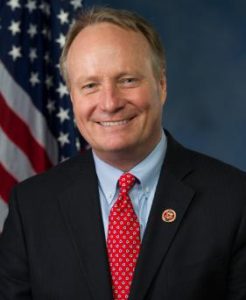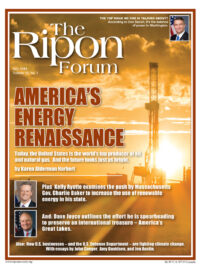
My favorite summer pasttime is being out on a boat on Lake Erie, fishing and spending quality time on the water with family and friends. It’s a tradition I have held on to since my childhood. Today, I have a family of my own and now they too know the joy it brings.
I’ve said it once and I’ll say it again; the Great Lakes are an economic, environmental, and international treasure. The Lakes account for more than 20 percent of the world’s fresh surface water supply, and they provide drinking water for more than 40 million people.
Yet time and time again, no matter who is sitting in the Oval Office, the administration tries to either zero out or drastically cut funding to protect and preserve the Great Lakes. This year, President Trump cut the Fiscal Year 2019 budget request by 90 percent from the amount we appropriated for Fiscal Year 2018. This is unacceptable.
The Lakes account for more than 20 percent of the world’s fresh surface water supply, and they provide drinking water for more than 40 million people.
I am proud to stand up and advocate for the restoration and protection of the Great Lakes through the Great Lakes Restoration Initiative and other programs. Many of the Members of Congress that represent States with shorelines on the Great Lakes joined me in these efforts to continue their restoration and protection. After much hard work with my great colleague and friend, Congresswoman Marcy Kaptur (D-OH-09), the House Appropriations Committee-approved Fiscal Year 2019 spending bill contains $300 million for the Great Lakes Restoration Initiative to help protect our Great Lakes from harmful algal blooms, nonpoint source pollution, and invasive species and provide habitat restoration.
This is truly a bipartisan issue that is not only so important to our region, but also the entire nation.
In early June, the House passed the Water Resources Development Act, also known as WRDA. Included in that legislation is an amendment that I introduced to help keep invasive Asian carp out of the Great Lakes. The U.S. Army Corps of Engineers has been conducting a study on the Brandon Road Lock and Dam. My amendment directs the Corps to release the final study by February 2019 so we can move forward and implement the next steps to keep Asian carp from getting into the Great Lakes.
Protecting and restoring the Great Lakes is not only in the best interest of our nation, but of the international community.
Let me explain why the Brandon Road Study language is critical. As I mentioned before, I, like many of you, enjoy boating and fishing on Lake Erie. Sport fishing is a huge tourist attraction, which helps to build the economy of the Great Lakes region. The industry contributes $4 billion to the economy. If Asian carp get into the Great Lakes, they are likely to compete with native fish species, like walleye and trout, for food. These negative consequences would devastate the sport fishery industry and the regional economy. This translates to jobs and tourism losses in Northeast Ohio if we don’t take action. We must act with a sense of urgency now, so that our kids and grandkids can continue to enjoy Lake Erie and the other Great Lakes.
Protecting and restoring the Great Lakes is not only in the best interest of our nation, but of the international community. The Great Lakes are filled with amazing wildlife, natural resources, and are available for all to enjoy in sport and serenity. According to the National Oceanic and Atmospheric Administration’s Great Lakes Environmental Research Laboratory, they provide fresh drinking water to 40 million people, while also providing 56 billion gallons of water per day for municipal, agricultural, and industrial use.
We depend on this water, which is why I am also so proud of the work my colleagues and I, from across the political spectrum, have done in Congress to preserve this treasure. It may not appear like it on television, the computer screen, or in the newspapers, but there is definitely more that unites us than separates us. Preserving the Great Lakes is one issue almost everyone agrees on. They need to be protected and preserved for the thriving economy, fresh water sources, and so they can continue to bring entertainment and joy to people from all over the world. Summertime has officially arrived so let’s all go out and enjoy a beautiful international treasure, the Great Lakes!
David Joyce is the U.S. Representative for Ohio’s 14th Congressional District.




